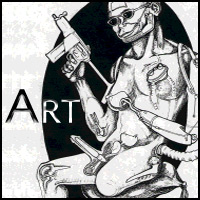
Cyber GenderJennifer Breen I cannot remember the first time I used a computer, I must have been two or three years old. This was before everyone had a home computer, but we did. I grew up playing simple video games and learning how to program in Q-Basic on my old AT&T 6300. I do, however, remember the first time I used the internet. Technically I was not using what we have come to think of as, "The Internet,, " but a BBS (bulletin board service). BBSs were my play ground . At seven I was still too young to realize how ground breaking this technology was. Today I use the internet for a variety of different reasons, communication, education, and fun, are the most common uses of the internet for me. I cannot help but feel like my life is fundamentally different because of my relationship to the internet. I have had the same screen name since I was seven years old, not only that, but I am the only person with that screen name. , "The new identity is formed from the relationship between the original identity and the internet. It is a Cyborg identity, part machine, part human. In his website Internet Cyborg Ted Kaiser states,, "The new identity is formed from the relationship between the original identity and the internet. It is a cyborg identity, part machine, part human., " While I agree with Kaiser that the internet identity is a Cyborg, I would go further and state that I am also a Cyborg. If you become a member of The Borg in Star Trek, you join the collective, but the collective also joins you. While the internet might not join you in a physical way (such as with the Borg) it does become apart of you. The internet identity you create might be an extension of yourself, but you too become an extension of that identity. Unlike in the real world, in cyberspace you have control over the identity you create. While we may not be able to chose who we are in the real world, online we have complete control of who we are. Our identity in the real world is molded by our sex, age, race, and other factors well out of our control, but online we can chose to strip ourselves of these factors (or keep them intact) as we please. According to Frank Webster in his paper, "Cybernetic Life: Limits to Choice,, ", "Today, postmodern identity is crucially about the individual choosing his or her identity, choosing this freely., " (Webster 37) While the internet might not allow us to completely chose our identity in the real world, we can at least express our identity in a way we which to be seen. Because identity is a multifaceted concept, it is rare that a person would chose to change their whole identity. More common people will chose to change certain aspects of their identity rather then remake themselves completely. Gender is one facet of identity that people will commonly change online. There are many reasons why people would chose to change their gender online, ranging from, "just for fun, " to expressing who they feel they are in the inside. In , "Do Boys (and Girls) just wanna have fun? : Gender Switching in Cyberspace, " J.R Suler discusses some of the different reasons why people would chose to switch gender. Men may want to switch gender because they want to express some feminine aspects of themselves that cultural stereotypes may make them unable to express in real life. While other men may chose to be female in an online game because other men are more likely to help out a female, thus allowing them to level faster in the game. Females on the other hand are likely to gender switch so that they can become more empowered then they would as a female online persona. Women also gender swap so that they can see what it is like to, "be one of the guys,, " or see how other women interact with men on the internet. Another reason why someone of either sex may chose to gender swap on the internet is because of sexuality. Some people gender swap on the internet to enter into relationships with people of the same sex because they are not able to be in a same sex relationship in real life, or are just testing the waters. For some people being able to create their own online persona that is of the opposite sex it not something they do for fun, but they do because they fundamentally feel that they are the opposite sex. Transsexuals can create a persona online to allow them to be the sex they feel they should be, if only while they are in cyberspace (Suler). I feely admit to gender swapping online. While my main online identity is close to who I am in real life, I have been known to have other online personas for a variety of different reasons. Sometimes just for fun, sometimes because I wanted to see what it was like to be a guy, even if it was just online. While I do occasionally pretend to be male, more often I chose to be non gendered. The internet and cyberspace allows for the deconstruction of binary genders, and allows people to move beyond gender. In The Cyborg Manifesto, Donna Haraway discusses how the patriarchal creation myth does not apply to Cyborgs, and thus they do not have the same assumptions on things like gender., "Cyborgs might consider more seriously the partial, fluid, sometimes aspect of sex and sexual embodiment. Gender might not be global identity after all, even if it has profound historical breadth and depth, " (Haraway). The internet Cyborg sees gender as something that can be changed at any time if they please, and they are not always bound to the male/female gender system. For real life transsexuals, ascribing to the male/female gender system is a requirement to get the full gender reassignment surgery. In The "Empire" Strikes Back A posttransexual Manifesto Sandy Stone discusses the obstacles that people went through to get gender reassignment surgery. In order to be a candidate for reassignment surgery you had to be deemed, "appropriate, " for your chosen gender. The guidelines for being, "appropriate, " were based off Harry Benjamin's book The Transsexual Phenomenon. While many people wanted to get reassignment surgeries, most of them did not really fit the guidelines of Benjamin's book, they however were reading the book to know what the guidelines were to know how to act when they got reviewed (Stone). Unlike gender reassignment surgery, sex changes on line are relatively easy. The internet Cyborg can change their sex multiple times a day, there is no real life body holding them back. While the ability to create a non-gendered persona online exists, much of cyberspace is gendered. The game World of Warcraft (WoW) allows people to create a character they can pilot through the world. WoW requires you to chose either male or female for your character. While as far as the actual game is concerned, the only difference between a male character and a female character is their graphical appearance, the social aspects of the game tend to reinforce the gender binary. I have known men who played female characters in WoW because females are more likely to get others to help with quests, and are more likely to get free items from people. Just having a female character does not mean you will get special treatment, you have to make the other people believe that the person on the other computer is a female. I have never meet any real life female gamers who try to make other people think they are female because they do not want to be hit on, or thought of as less of a player because they are female. By being able to change gender at will, the internet Cyborg is able to cause a significant change in the way that we think about gender. Each person who participates in gender swapping online is able to express parts of themselves that they may not normally be able to in our society. Gender is no longer something that is static and unchanging, it is something that can be toyed with, at least in cyberspace. Bibliography
Dixon, Steve. "Metal Gender." Ctheory.Net. 15 May 2003. 01 June 2007 |










